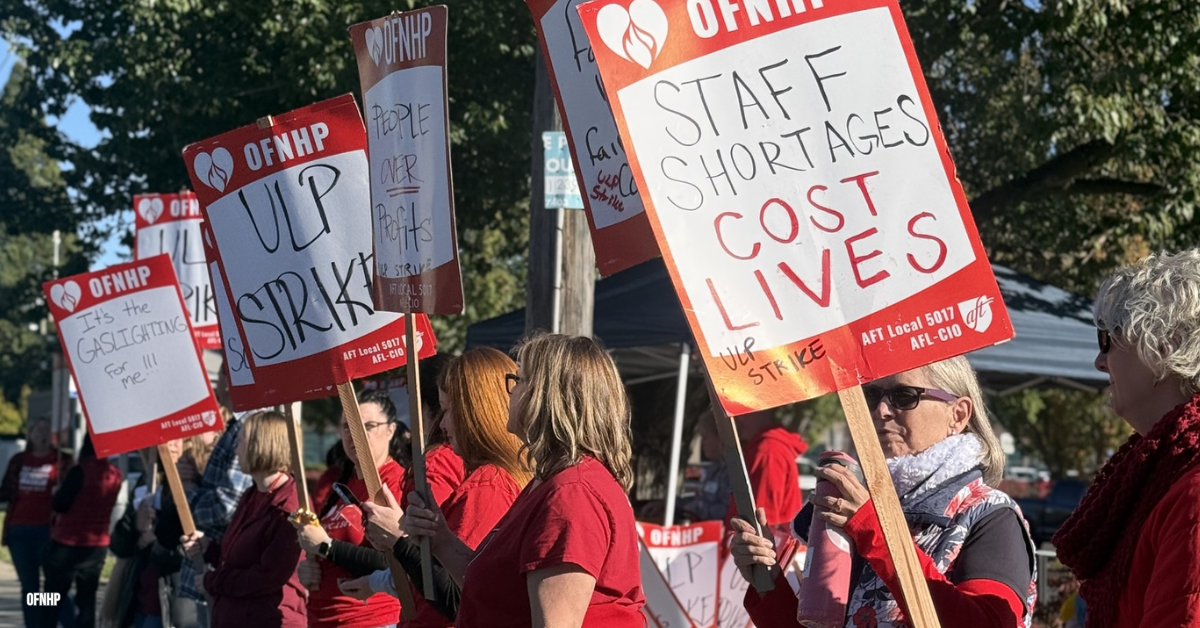NEWS ROUNDUP
Kaiser strike | WIC funding | Black lung
Wednesday, October 15, 2025
STRIKES

► From Oregon Live — 4,000 Kaiser Permanente workers in Oregon, SW Washington walk off the job — Robin Esperanza, a nurse case manager in Sunnyside’s emergency department, said she began her shift at 6 a.m. but left an hour later to join the picket line. Esperanza said she and other nurses are striking in protest of persistent understaffing, saying it leaves them responsible for more patients than they can safely care for. “We’ve been working hard with so little resources since the pandemic,” Esperanza said, “and we’ve been expected to do even more with less and less.”
► From KATU — Kaiser Permanente workers strike in Oregon and Washington, join nationwide picket lines — Other union members who work at Kaiser shared those same sentiments, like Gina Mann. “For us, the big issue is retaining and recruiting staff that is going to be able to meet the quality of care and the standard that Kaiser has promised our community and that we promised our community,” Mann told KATU. “I think for us, we really just want to make sure that we match the market rate adjustments that people need and we’re bargaining for the appropriate cost of living adjustments.”
LOCAL

► From NW Public Broadcasting — Without federal funding, Whitman County WIC program set to shut down this month — Without federal funding, WCPH director Chris Skidmore said the local WIC program that serves the Pullman area will shut down. “ I think there’s a lot of despair in a lot of our clients because, at the same time, a lot of the other resources that they could, you know, take advantage of are also being cut,” Skidmore said. It’s estimated that about 2.4 million people may no longer have access to SNAP food benefits under new rules signed into law by the Trump administration this summer. Skidmore worries that people who lose access to WIC benefits might not be able to get help through the SNAP program, either.
► From the Seattle Times — Fred Hutch, UW Medicine pause H-1B visa petitions — Fred Hutch spokesperson Claire Hudson confirmed the pause this week, attributing it to the “rapidly changing federal situation around employer sponsorship of immigrant workers.” The halt applies only to new potential hires, she said. The cancer center declined to make an official available for an interview. Up until now, Fred Hutch has been one of the state’s top health care employers of H-1B visa holders. Over the last five years, the world-renowned clinical and research institution has had 181 such visa applications approved, according to U.S. Citizenship and Immigration Services data.
► From the Spokesman Review — Health official warns thousands across Washington could lose health care if tax credit not extended — An estimated 80,000 Washingtonians could be priced out of health insurance if the tax credits at the center of the ongoing federal government shutdown expire, according to the CEO of the Washington Health Benefit Exchange…According to data provided by the Washington Health Benefit Exchange, the credits decrease yearly premium costs for customers by an average of $1,330. “If the enhanced level of these tax credits is allowed to expire, it will be people in our most rural counties, those who run small businesses or who are self-employed and older adults who are not yet eligible for Medicare who will face the steepest premium increases,” Ulrey said in a statement Tuesday.
CONTRACT FIGHTS
► From the Hollywood Reporter — SAG-AFTRA Gets in the Verticals Game — The performers union stated on Monday that a contract specifically tailored to the booming microdrama format would be forthcoming by the end of the month. This “Verticals Agreement” will cover projects that have budgets of under $300,000, in keeping with the typically small budgets and tight turnarounds of these made-for-mobile titles. SAG-AFTRA president Sean Astin called verticals an “exciting new space” in a statement. “This fast-evolving format is catching on and we are here to support our performers as they pursue their craft and engage this new business model,” Astin said. “By offering a contract that is tailored to the unique needs of these projects, our union is meeting the moment. As the business of verticals experiences substantial growth, so too will our relationship with the producers.”
► From the Seattle Times — Broadway enters an anxious time as labor action threatens to roil theaters — Actors’ Equity Association — which represents over 51,000 members, including singers, actors, dancers and stage managers — and American Federation of Musicians Local 802 — which represents 1,200 musicians — have voted in favor of a strike authorization, a strategic step ahead of any work stoppage. No strike has been called…Both unions want pay increases and higher contributions by producers toward employee health care costs, a key sticking point. Actors Equity also wants producers to hire more backup performers and stage managers, add protections for performers in the event of injury and put limits on how many performances in a row actors can be asked to do without a day off.
NATIONAL

► From the AP — Stellantis says it will invest $13B to expand its US operations, adding more than 5,000 jobs — Stellantis says it will invest $13 billion over the next four years to expand its manufacturing capacity in the United States, a move that the automaker says will increase its domestic vehicle production by 50% and add more than 5,000 jobs. The world’s fourth-largest carmaker said Tuesday the investment will support the introduction of five new vehicles, including a Dodge Durango to be built in Detroit and a midsize truck to be assembled in Toledo, Ohio. The new jobs will be spread across plants in Illinois, Ohio, Michigan and Indiana.
► From UAW:
Facing auto tariffs and pressure from UAW members, Stellantis has made a major announcement about future product!
Watch as UAW Stellantis Department Director Kevin Gotinsky and @ShawnFainUAW share this historic investment news 📽️ pic.twitter.com/LKAJQhfX3f
— UAW (@UAW) October 15, 2025
► From the AP — Group including Nvidia, BlackRock buying Aligned Data Centers in deal worth about $40 billion — The acquisition comes amid a flurry of deals in recent months involving top AI developers that are flooding the booming AI sector with resources and money, and addressing resources — such as electricity and infrastructure — needed to support such technology.
► From the Guardian — ‘The city that draws the line’: one Arizona community’s fight against a massive data center — The $3.6bn project wasn’t on most Tucsonans’ radar until 17 June, when the county board of supervisors narrowly agreed to sell and rezone a parcel of land just south-east of town to the developer Beale Infrastructure…The episode in Tucson illustrates the secretiveness and tenacity with which developers are rushing to build data centers throughout the US, and the emotionally charged mix of issues that confront communities, weighing sometimes murky promises of economic incentives and jobs against effects on the environment and natural resources.
► From the Seattle Times — Before Alaska flooding, EPA canceled $20 million flood protection grant — But in May, the EPA revoked the grant, which was issued at the end of the Biden administration, saying it was “no longer consistent” with the agency’s priorities. EPA Administrator Lee Zeldin boasted on social media that he was eliminating “wasteful DEI and Environmental Justice grants,” referring to diversity, equity and inclusion initiatives, and programs to help communities facing a disproportionate level of environmental threats. It is unclear whether the work funded by the grant would have prevented the tragedy Sunday, which left one person dead and two missing in the neighboring village of Kwigillingok. But the disaster laid bare the area’s vulnerability to flooding and the consequences of the Trump administration’s cuts to environmental programs.
► From People’s World — Capital Realty Group tenants show how to organize against a negligent landlord — The unprecedented nature of their organizing, which has taken place across state lines, opens doors for tenants everywhere as they join forces under the banner of the national Tenant Union Federation. Seven buildings have already joined this campaign since its kickoff in August, when the Park Ridge Tenants Union—an affiliated chapter of the statewide Connecticut Tenants Union—went public with its demands for collective bargaining with their massive corporate landlord, the Capital Realty Group of Spring Valley, N.Y. The Capital tenants who’ve organized so far are located in New Haven, Conn., Detroit, Louisville, Ky., Kansas City and Lee’s Summit, Mo., and Billings, Mont., and represent nearly 1,000 units of housing across those geographies. No doubt these ranks will be further swelled soon; Capital Realty owns over 14,000 units across the country, and thousands of their tenants face similar plights.
POLITICS & POLICY

► From Fortune — ‘It seems like they don’t care about us’: Rural America ruptured as coal miners protest lax rule enforcement linked to black lung — Miners on Tuesday are gathering outside the Labor Department building to protest the Trump administration’s move to indefinitely postpone the federal enforcement of a rule limiting exposure to carcinogenic silica dust particles. Miners argue increased subjection to the dust has led to an eruption of black lung, an incurable disease associated with inhaling the particles. “The mine workers obviously take extreme interest in the passing of the silica rule, because it is our members and our workers that are being affected by silica dust exposure on a daily basis,” Erin Bates, director of communications for the United Mine Workers of America (UMWA), which represents coal miners, told Fortune. “Every single day that this rule is not in place means another death for a coal miner.”
► From the UMWA:
► From the AP — Trump and budget chief Vought are making this a government shutdown unlike any other –As the shutdown enters its third week, the Office and Management and Budget said Tuesday it’s preparing to “batten down the hatches” with more reductions in force to come. The president calls budget chief Russ Vought the “grim reaper,” and Vought has seized on the opportunity to fund Trump’s priorities, paying the military while slashing jobs in health, education, the sciences and other areas with actions that have been criticized as illegal and are facing court challenges….Vought, a chief architect of the conservative Project 2025 policy book, is reshaping the size and scope of federal government in ways similar to those envisioned in the blueprint. It is exactly what certain lawmakers, particularly Democrats, feared if Congress failed to fund the government.
► From the Washington Post — Who will lose out when ACA health insurance subsidies expire? — Some 22 million Americans are set to lose health insurance subsidies by the end of the year. Who are they, and what will happen if the subsidies are allowed to expire? These subsidies, known as enhanced premium tax credits, lower costs for people who buy their health insurance through Affordable Care Act (ACA) marketplaces (sometimes called Obamacare). They are at the heart of a weeks-long standoff that has shuttered the federal government since October 1. About 80 percent of the people who benefit from them live in states that Donald Trump won in the 2024 presidential election. Many have no idea that their health insurance costs are on track to go up.
► From KUOW — With new cuts at CDC, some fear there’s ‘nobody to answer the phone’ — State and local health departments are feeling the effects. When faced with problems such as outbreaks of food poisoning or hospital infections, they’ve traditionally reached out to the CDC for help. “Sometimes that help might be — we’re going to send some people to help you investigate this. Sometimes that might be talking to somebody who’s the world’s expert on a specific type of infection or exposure,” said Dr. Karen Remley, a former CDC official and former health commissioner for Virginia, at the NPHC press conference. “Now, there’s nobody to answer the phone.”
► From the AP — Supreme Court seems inclined to limit race-based electoral districts under the Voting Rights Act — The court’s six conservative justices, to one degree or another, seemed like they would vote to effectively strike down a Black majority House district in Louisiana because it relied too heavily on race. Such an outcome could mark a fundamental change in the voting rights law, the centerpiece legislation of the Civil Rights Movement, that succeeded in opening the ballot box to Black Americans and reducing persistent discrimination in voting. A ruling for Louisiana could open the door for legislatures to redraw congressional maps across the South, potentially boosting Republican electoral prospects by eliminating majority Black and Latino districts that tend to favor Democrats.
► From Politico — Senate GOP will try to advance full-year spending bills amid shutdown — Senate GOP leaders are looking to pressure Democrats to make progress on full-year spending bills that would fund the Pentagon and a handful of other federal agencies amid the government shutdown. Majority Leader John Thune teed up the House-passed Defense appropriations bill Tuesday for an initial procedural vote, where it will need 60 votes to advance. That vote is set for Thursday. Separately, Republicans are attempting to expedite the process of instructing lawmakers to go to conference with House counterparts on “minibus” legislation that would fund the Departments of Agriculture and Veterans Affairs, the FDA and the operations of Congress, among other offices and agencies.
► From the Washington State Standard — Washington AG pushing new law to protect workers from immigration raids — Attorney General Nick Brown is proposing legislation, dubbed the Immigrant Worker Protection Act, that would require employers to notify their employees of a planned inspection of employment eligibility paperwork within 72 hours of being notified about it by U.S. Immigration and Customs Enforcement. Other states, including California, Oregon and Illinois, already have similar laws…“While the employer is given 72 hours to gather and produce their employees’ I-9 forms, employees often have no idea that their I-9 documents are being sent for review,” spokesperson Mike Faulk said. “This bill would give workers the opportunity to get their documentation in order, speak to an attorney, or make plans with their family if needed.”
The Stand posts links to local, national and international labor news every weekday morning. Subscribe to get daily news in your inbox.





